Download
News 2012/21
Brian Wilson
Recording
of the Month
Sir Edward ELGAR (1857-1934)
The Starlight Express, Op. 78* [86:50]
Clive CAREY (1883-1968)
Three Songs from ‘The Starlight Express’† (orch.
Sir Andrew Davis) [6:03]
Sir Edward ELGAR
Suite from ‘The Starlight Express’‡ (arr. Sir
Andrew Davis) [44:57]
Elin Manahan Thomas (soprano) – Laugher/Jane Anne*‡
Roderick Williams (baritone) – Organ-grinder/Gardener*†‡
Simon Callow (narrator)*
Scottish Chamber Orchestra/Sir Andrew Davis – rec. May
and August 2012. DDD/DSD.
* premiere recording in this version
† ‡ premiere recordings
Pdf booklet available.
CHANDOS CHSA5111 [58:03 + 80:05] – from theclassicalshop.net
(mp3, 16– and 24-bit lossless and 24-bit surround)
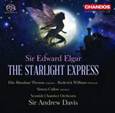 There
are three firsts in one here – the first absolutely complete
Starlight Express music, coupled with the first recordings
of the Clive Carey songs and the substantial suite which Sir
Andrew Davis has arranged from the Elgar work. Good as the Vernon
Handley recording was – formerly a wonderful bargain on
Classics for Pleasure but now available only in a 30-CD set
– it lacked the last degree of completeness, in order to
fit on one disc. Similarly, Andrew Davis’s extended suite
is much longer than Elgar’s own, available conducted by
George Hurst on Chandos Collect at budget price (CHAN6582)
and from Sir Charles Mackerras on Decca Eloquence, also at budget
price (442 8280, 2 CDs).
There
are three firsts in one here – the first absolutely complete
Starlight Express music, coupled with the first recordings
of the Clive Carey songs and the substantial suite which Sir
Andrew Davis has arranged from the Elgar work. Good as the Vernon
Handley recording was – formerly a wonderful bargain on
Classics for Pleasure but now available only in a 30-CD set
– it lacked the last degree of completeness, in order to
fit on one disc. Similarly, Andrew Davis’s extended suite
is much longer than Elgar’s own, available conducted by
George Hurst on Chandos Collect at budget price (CHAN6582)
and from Sir Charles Mackerras on Decca Eloquence, also at budget
price (442 8280, 2 CDs).
The narration by Simon Callow – added separately, though
you wouldn’t think so – takes us though the action
of the play for which Elgar wrote this incidental music, while
the suite contains all the significant vocal and orchestral
music.
The whole project represents as bold an undertaking as the recent
Chandos/Davis recording of Crown of India and it deserves
to prove even more popular than that. Chandos have been offering
us some ground-breaking and ambitious recordings of English
music recently; making this Recording of the Month is a small
acknowledgement of their enterprise.
Reissue
of the Month
 Hector
BERLIOZ (1803-1869) L’Enfance du Christ,
Op.25
Hector
BERLIOZ (1803-1869) L’Enfance du Christ,
Op.25
Peter Pears (tenor), Elsie Morrison (soprano), John Cameron
(baritone), Joseph Rouleau (bass), Edgar Fleet (tenor); St Anthony
Singers; Goldsborough Orchestra/Sir Colin Davis
BEULAH EXTRA 23-33BX129[97:58] – from eavb.co.uk.
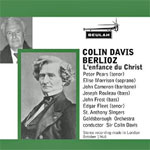 Among
the Christmas choral blockbusters, L’Enfance du Christ
is something of an orphan by comparison with Handel’s Messiah
and Bach’s Christmas Oratorio, apart from the ubiquitous
Shepherds’ farewell. To be honest, I can’t
remember when I last chose to listen to it – and this reissue
reminds me what I’ve been missing. This is the first Colin
Davis recording, made in 1960 for the Oiseau-Lyre label, not
his later Philips remake or his even more recent version for
the LSO’s own label. With that LSO Live version apparently
the only one currently available in the UK, this Beulah reissue
of Mark 1 is very welcome. On its first appearance Alec Robertson
wrote ‘There is no need for any critical hesitation here.
This performance of L’Enfance du Christ has all
the qualities that I have for years dreamt of and longed for’
and that remains true.
Among
the Christmas choral blockbusters, L’Enfance du Christ
is something of an orphan by comparison with Handel’s Messiah
and Bach’s Christmas Oratorio, apart from the ubiquitous
Shepherds’ farewell. To be honest, I can’t
remember when I last chose to listen to it – and this reissue
reminds me what I’ve been missing. This is the first Colin
Davis recording, made in 1960 for the Oiseau-Lyre label, not
his later Philips remake or his even more recent version for
the LSO’s own label. With that LSO Live version apparently
the only one currently available in the UK, this Beulah reissue
of Mark 1 is very welcome. On its first appearance Alec Robertson
wrote ‘There is no need for any critical hesitation here.
This performance of L’Enfance du Christ has all
the qualities that I have for years dreamt of and longed for’
and that remains true.
I’m not a great fan of the timbre of Peter Pears but his
performance as narrator has not been bettered and the other
soloists can all hold their own, even with the incomparable
Dame Janet Baker as Mary on the Philips recording as against
Elsie Morison here, singing low in her register. Joseph Rouleau
as Herod, singing of the hardships of being a king (Toujours
ce rêve … Ô misère des rois) offers
a particularly strong argument for this early recording.
In this transfer the recording holds its own as well as the
performance does. There’s no libretto, but that’s
easy to come by, for example at berlioz.com.
If my maths is correct, the cumulative price of all the tracks
is £7.75, thereby making this reissue commensurate cost-wise
with the fine 2-for-1 Hyperion Dyad recording at £7.99:
CDD22067 from hyperion-records.co.uk,
mp3 and lossless, with libretto. (Bargain of the Month
– review.)
Discovery of
the Month
Domenico SCARLATTI (1685-1757)
Tetide in Sciro (1712?)
Wanda Madonna (contralto), Giuliano Ferrein (bass), Luciana
Pio-Fumagalli (soprano), Carlo Franzini (tenor), Valerio Meucci
(baritone), Adriana Martino (soprano)
Milan Angelicum Orchestra/Aladar Janes – rec. 1958. ADD/mono
NAXOS HISTORICAL ARCHIVES 9.80957-59 [3 CDs: 51:34 +
51:25 + 50:11] – download only (no CD) from classicsonline.com
or emusic.com
(mp3) or stream from Naxos Music Library. (Not available in
USA, Australia or Singapore).
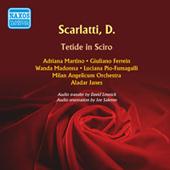 Domenico
Scarlatti was an exact contemporary of JS Bach and Handel but,
while his keyboard music has received a good deal of attention,
his vocal works have been comparatively neglected. Certainly
his only opera seria, Tetide in Sciro, of which this
is to the best of my knowledge the only recording ever made,
is no match for Handel at his best, but I was pleased to make
its acquaintance. The performance may not be all that we expect
nowadays for baroque opera but it gives a more than adequate
indication of the quality of Scarlatti’s music.
Domenico
Scarlatti was an exact contemporary of JS Bach and Handel but,
while his keyboard music has received a good deal of attention,
his vocal works have been comparatively neglected. Certainly
his only opera seria, Tetide in Sciro, of which this
is to the best of my knowledge the only recording ever made,
is no match for Handel at his best, but I was pleased to make
its acquaintance. The performance may not be all that we expect
nowadays for baroque opera but it gives a more than adequate
indication of the quality of Scarlatti’s music.
The sound is rather dry but more than acceptable in this transfer.
The lack of notes – no libretto or even synopsis –
creates a problem though if your Italian is up to it, you’ll
find some details at operamanager.it.
Achilles, disguised by his semi-divine mother Thetis (‘of
the silver feet’ according to Homer) in women’s clothes
at the court of Lycomedes on Skyros under the assumed name of
Arminda, has been warned to avoid the Trojan war as portending
his doom. Ulysses (Odysseus), sent by Agamemnon to find him,
discovers the deception and convinces the hero to join the Greek
expedition. The love interest which sustains the action concludes
with the marriage of Achilles and Deidamia and of Antiope and
Lycomedes.
The emusic.com version costs only £1.26 but the bit-rates
are rather mean, 160-162 kb/s at best; the classicsonline.com
version won’t break the bank, either, at £5.97 and
it comes in 320 kb/s sound.
Music for
Advent, Christmas and Epiphany
 Midnight
Mass of the Nativity; Matins Invitatory: Christus natus est
[20:41]
Midnight
Mass of the Nativity; Matins Invitatory: Christus natus est
[20:41]
Monks of the Abbey of Saint Pierre de Solesmes/Dom Joseph Gajard,
OSB – rec. 1953. ADD/mono
BEULAH EXTRA 4BX162 [20:41] – from eavb.co.uk.
 Third
Mass of Christmas Day; Vespers Hymn: Christe redemptor;
Antiphon: Ecce nomen Domini; Sequence: Ave Maria [20:29]
Third
Mass of Christmas Day; Vespers Hymn: Christe redemptor;
Antiphon: Ecce nomen Domini; Sequence: Ave Maria [20:29]
Monks of the Abbey of Saint Pierre de Solesmes/Dom Joseph Gajard,
OSB – rec. 1953. ADD/mono
BEULAH EXTRA 5BX162 [20:29] – from eavb.co.uk.
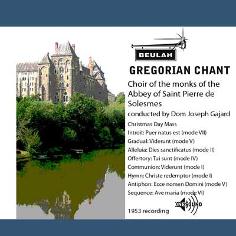 The
Solesmes choir under Dom Joseph Gajard were trend-setters in
the editing and performing of plainchant, with recordings from
the 1930s onwards. These performances of the first and third
masses of the Nativity appeared in 1956 on Decca LXT5251 to
a warm welcome. The recording, too, was very good for its time,
albeit in mono only. Though there have been other recordings
since which aim at reproducing the authentic sound of plainsong
at a particular period of history – it has been something
of a moveable feast – it was Solesmes who established the
modern norm and these reissues of their singing the Christmas
Masses make recommendable reissues.
The
Solesmes choir under Dom Joseph Gajard were trend-setters in
the editing and performing of plainchant, with recordings from
the 1930s onwards. These performances of the first and third
masses of the Nativity appeared in 1956 on Decca LXT5251 to
a warm welcome. The recording, too, was very good for its time,
albeit in mono only. Though there have been other recordings
since which aim at reproducing the authentic sound of plainsong
at a particular period of history – it has been something
of a moveable feast – it was Solesmes who established the
modern norm and these reissues of their singing the Christmas
Masses make recommendable reissues.
A small blip at the end of the Christmas Day Mass may well have
arisen in the process of transfer to CD. Beulah have kindly
sent me a download of the track and it sounds fine.
 Heinrich
von HERZOGENBERG (1843-1900)
Heinrich
von HERZOGENBERG (1843-1900)
Die Geburt Christi (The Birth of Christ, 1894)
Regina Schudel (soprano), Anke Eggers (alto), Peter Maus (tenor),
Ernst-Gerold Schramm (bass), Rudolf Heinemann (organ), Michael
Röbbelen (positive organ)
Ensemble Oriol, Staats– und Domchor Berlin, Kammerchor
der Hochschule der Künste Berlin/Christian Grube
Rec. Jesus-Christus Kirche, Berlin-Dahlen, 26-28 January, 1988.
DDD.
Booklet with German text included
HÄNSSLER CLASSIC 98.001 [54:42 + 27:29] – from
classicsonline.com
(mp3)
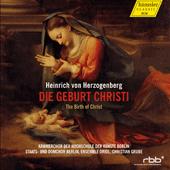 You
won’t be surprised when you look at the recording date
to learn that this recording has been once round the block already
– indeed, it’s still available on CD and as a download
with its former catalogue number 98.574. There’s
a more economical rival recording on CPO 777211-2, complete
on one CD and available to download for £4.99 from classicsonline.com.
Unfortunately the timings for the Hänssler recording just
miss the limit for one disc but, surely, something else could
have been found as a filler – less than 83 minutes on two
CDs is rather extravagant.
You
won’t be surprised when you look at the recording date
to learn that this recording has been once round the block already
– indeed, it’s still available on CD and as a download
with its former catalogue number 98.574. There’s
a more economical rival recording on CPO 777211-2, complete
on one CD and available to download for £4.99 from classicsonline.com.
Unfortunately the timings for the Hänssler recording just
miss the limit for one disc but, surely, something else could
have been found as a filler – less than 83 minutes on two
CDs is rather extravagant.
Herzogenberg is often regarded as an untalented imitator of
Brahms but die Geburt Christi proves that snap judgement
to be incorrect. This is an utterly charming work produced in
association with the Protestant theologian Spitta, blending
the composer’s Catholic sensitivity with music for Lutheran
performance interspersed with congregational singing of chorales
– ein’ feste Burg and O Haupt voll Blut
und Wunden here pressed into service with different words
as, indeed, the latter was by Bach in his Christmas Oratorio.
Traditional carols such as Es ist ein Ros’ entsprungen
are treated to fresh and attractive arrangements.
I listened to the CPO recording for comparison – a live
recording with some of the limitations which that implies, including
somewhat opaque sound in the chorales, but that’s not a
major problem and it’s generally very attractive and a
real bargain as a download. The lack of text is easily remedied
– you can find it at http://www.herzogenberg.ch/geburt_volltext.htm.
There’s no translation, but neither is there with the Hänssler.
The Hänssler booklet is informative but could do with including
an English translation of the German text; it doesn’t include
even Herzogenberg’s dates.
 Arnold
MENDELSSOHN (1855 – 1933)
Arnold
MENDELSSOHN (1855 – 1933)
Christmas Motets (1923/4); Deutsche Messe (1923)
Deutsche Messe, Op.89 (German Mass for 8-part Choir a
cappella and soloists) [28:12]
Träufelt, ihr Himmel, von oben (Advents-Motette
Op.90/5) (Drop down dew, ye heavens) [13:48]
Lobt Gott, ihr Christen (Motette zum Weihnachtsfest Op.90/9)
(Praise God, ye Christians) [13:53]
Siehe! Finsternis decket das Erdreich (Motette zum Epiphaniasfest
Op.90/10) (Behold! Darkness shall cover the Earth) [10:13]
SWR Vokalensemble Stuttgart/Frieder Bernius
rec. SWR Studio, Stuttgart, Germany, 26 September, 2008, 20
February, 2009, 25-6 June, 2009, 10-11 December 2009 and 12-13
January 2011. DSD
Booklet with texts and translations
HÄNSSLER CLASSIC 93.293 [66:34] – from classicsonline.com
(mp3) or stream from Naxos Music Library
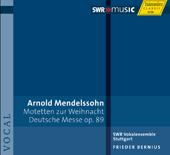 Arnold
Mendelssohn was the son of the nephew of Felix Mendelssohn,
though he never knew his more famous relative. He spent most
of his life in the service of the Protestant church and, if
the music here is typical, did well in that service. The German
Mass which opens the recording owes much to his interest
in earlier musical forms – I hear the influence of Schütz,
for example, as well as the more obvious JS Bach – but
he is completely his own man. His great-uncle’s* music,
too, was clearly an influence and, while I can’t claim
that he deserves to be as well known – as, for example,
Giovanni Gabrieli does in relation to his uncle Andrea –
he equally doesn’t deserve to be so little known. Performances
and recording do his music justice – almost a given with
Frieder Bernius at the helm.
Arnold
Mendelssohn was the son of the nephew of Felix Mendelssohn,
though he never knew his more famous relative. He spent most
of his life in the service of the Protestant church and, if
the music here is typical, did well in that service. The German
Mass which opens the recording owes much to his interest
in earlier musical forms – I hear the influence of Schütz,
for example, as well as the more obvious JS Bach – but
he is completely his own man. His great-uncle’s* music,
too, was clearly an influence and, while I can’t claim
that he deserves to be as well known – as, for example,
Giovanni Gabrieli does in relation to his uncle Andrea –
he equally doesn’t deserve to be so little known. Performances
and recording do his music justice – almost a given with
Frieder Bernius at the helm.
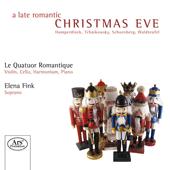
If you’re looking for more music by Arnold Mendelssohn,
there’s a Cantate recording of more of the Op.90 Geistliche
Chormusik – Nos.1, 4, 5, 6 and 11, so only one work
overlapping with the Hänssler recording. (CAN58005
[67:24] – download from classicsonline.com
(mp3) or stream from Naxos Music Library). There’s another
Christmas Arnold Mendelssohn work, Markt und Straßen
steh’n verlassen on an Ars Produktion CD, A late-romantic
Christmas Eve (ARS38086) which John Sheppard
recommended as full of seasonal delights – review:
download from classicsonline.com
(mp3).
* as between the German and English texts of the Hänssler
notes there’s some confusion about the relationship, with
Neffe zweiten Grades rendered as ‘second cousin’
and Onkel as ‘uncle’. Strictly, I suppose,
Felix was his great-uncle, but I’m not sure what the German
for that relationship is; ein grosser Onkel is a big toe.
 This
Christmas Night: Contemporary Carols
This
Christmas Night: Contemporary Carols
Hafliði HALLGRÍMSSON
(b. 1941) Joseph and the Angel * [3:43]
Anthony PICCOLO (b. 1946)
I look from afar [6:19]
Thomas HYDE (b. 1978) Sweet
was the song * [2:07]
Mark-Anthony TURNAGE (b. 1960)
Christmas Night * [2:45]
John McCABE (b. 1939) Mary
laid her child [2:21]
Malcolm WILLIAMSON (1931-2003)
This Christmas Night [3:06]
Matthew MARTIN (b. 1976)
I sing of a Maiden * [2:29]
Thomas HYDE Improvisation
on ‘Puer Natus’ * [5:16]
Judith BINGHAM (b. 1952)
Tu creasti Domine * [4:02]
Richard ALLAIN (b. 1965)
Balulalow * [1:50]
Mark-Anthony TURNAGE Claremont
Carol * [4:08]
Howard SKEMPTON (b. 1947) There
is no rose * [2:39]
Gabriel JACKSON (b. 1952)
Hush! my dear * [3:30]
Peter Maxwell DAVIES (b. 1934)
Fleecy Care Carol * [2:58]
Cecilia McDOWALL (b. 1951)
Of a Rose * [2:48]
Geoffrey BUSH (1920-1998)
’Twas in the year that King Uzziah died [3:05]
Elisabeth LUTYENS (1906-1983)
Nativity [5:55]
Edmund RUBBRA (1901-1986) Let
us securely enter [2:18]
Kenneth LEIGHTON (1929-1988)
O leave your sheep [4:14]
Veni Redemptor – A Celebration [10:16]
The Choir of Worcester College, Oxford/Stephen Farr (conductor
and organ); Edward Turner (conductor and organ)
Nicholas Freestone (organ) – rec. Keble College Chapel,
Oxford, 17-19 June, 2012. DDD.
* world premiere recordings
RESONUS CLASSICS RES10113 [75:59] – from resonusclassics.com
(mp3, aac or lossless flac) or eclassical.com
(mp3 and 16– and 24-bit lossless) or stream from Naxos
Music Library
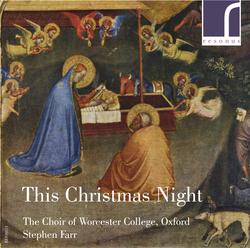 This
is another winner from Resonus Classics at the end of their
first year of production. I mentioned this recording as a postscript
to my previous Download News and I’m happy to confirm my
first favourable reaction. I’m pleased, too, to see recordings
appearing of the Oxford and Cambridge choirs which have been
less well known and this is one of the best to have come my
way. The music is unhackneyed – the vast majority of the
pieces are receiving their world premiere recording – and,
though the music is all contemporary or nearly so, there’s
not too much avant garde to tax more conservative listeners.
The opening ‘As Joseph was a-walking’, written specially
for this album, sets the tone: it’s clearly modern but
within an established tradition. All the performances are excellent
and the recording very good – I listened to the 16-bit
lossless wav from the formats which came to me for review.
This
is another winner from Resonus Classics at the end of their
first year of production. I mentioned this recording as a postscript
to my previous Download News and I’m happy to confirm my
first favourable reaction. I’m pleased, too, to see recordings
appearing of the Oxford and Cambridge choirs which have been
less well known and this is one of the best to have come my
way. The music is unhackneyed – the vast majority of the
pieces are receiving their world premiere recording – and,
though the music is all contemporary or nearly so, there’s
not too much avant garde to tax more conservative listeners.
The opening ‘As Joseph was a-walking’, written specially
for this album, sets the tone: it’s clearly modern but
within an established tradition. All the performances are excellent
and the recording very good – I listened to the 16-bit
lossless wav from the formats which came to me for review.
Ravello
Records: The Capstone Collection
Ravello Recordings have taken over the Capstone records collection
of contemporary music in download-only format ‘with the
intention of shepherding the company and its music into the
digital era’. The recordings are available from a variety
of providers, though the best combination of download quality
and value is usually to be found from eclassical.com, where
lossless flac is available at the same price as mp3 and that
price takes length of playing time into account so that the
Pierre Schroeder recording, for example, otherwise short value
at 52 minutes, is priced at just $9.35. If it’s bargain
pricing alone that you’re looking for, however, the classicsonline.com
price of £4.99 beats even eclassical.com’s per-second
rate.
I have to admit that not all the music is congenial to my conservative
taste – that’s one of the hazards of trying to cover
the whole range as almost a one-man band – but I enjoyed
a great deal of it. In most cases the original Capstone CD is
no longer available in the UK, so this is one for download only.
Pierre SCHROEDER Four Seasons:
Childhood, Adolescence, Maturity, Wisdom
Scott Breadman (Percussion), Ellen Burr (Flute), Giovanna Moraga
Clayton, Jakub Jerzy Omsky (Cello), Brad Dutz (Drums), Emily
Hay (Flute), Peter Ken, Carolyn Osborn (Violin), Ann Kim (Soprano,
Vocal), Joanne Lazzaro (Piccolo), Andrew Pask, Jim Sullivan
(Clarinet), Adriane Rosen (Double Bass), Luise Thomas (Piano),
Jessica Van Veltzen (Viola)/Harry Manfredini – rec. 2002.
RAVELLO RECORDS RR7827 [51:56] – from eclassical.com
(mp3 and lossless) or stream from Naxos Music Library
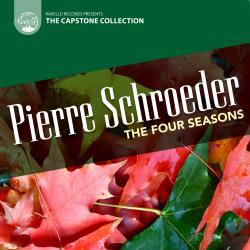 Though
best described as an experimental jazz-classical fusion by a
French composer living in the USA who has composed film music,
it’s impossible to give a real idea of what to expect from
this recording – I recommend sampling tracks from eclassical.com
or, better still, if you can, streaming from the Naxos Music
Library. The Seasons represented are not those of the year but
those of a human life. I enjoyed this and the lossless download
sounds well.
Though
best described as an experimental jazz-classical fusion by a
French composer living in the USA who has composed film music,
it’s impossible to give a real idea of what to expect from
this recording – I recommend sampling tracks from eclassical.com
or, better still, if you can, streaming from the Naxos Music
Library. The Seasons represented are not those of the year but
those of a human life. I enjoyed this and the lossless download
sounds well.
Bruce P MAHIN Shadows
Shadows (1990) [12:15]
Of Mice and Men (1989) [4:38]
Impressions for piano: Fear (1985) [5:15]
Rituals (1988) [8:19]
Cyclic Maneuvers (1987) [9:45]
Elizabeth Curtis (Soprano), Mark Lortz, Kujit Rehncy, Al Wojtera
(Percussion), Bruce P. Mahin (Computer and tape), Caryl Conger,
Adam Mahonske (Piano), David Shumway (cello)
Pdf booklet included
RAVELLO RECORDS RR7850 [40:12] – from eclassical.com
(mp3 and lossless) or stream from Naxos Music Library.
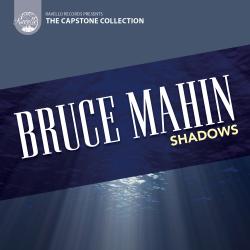 Despite
the notes contained with the eclassical.com download, I have
yet to figure out what Shadows has to do with the Walt
Whitman poem which apparently gave rise to it, largely because
I couldn’t hear the words; in any case I much prefer them
as set by Delius in Sea Drift, at the risk of being labelled
reactionary. Contrary to expectations, Of Mice and Men
has no connection with the Steinbeck novel but concerns a cat-and-mouse,
or rather cat-and-human game between two protagonists. I have
to admit that I found the music outside my comfort zone; this
is definitely one for the timid to check out first from the
Naxos Music Library if possible. But persevere; just when I
thought I was getting nowhere, along came Rituals on
track 3 and I found myself in accord with the music. Eclassical.com
compensate for the short playing time with an asking price of
just $7.24, with mp3 and lossless at the same price.
Despite
the notes contained with the eclassical.com download, I have
yet to figure out what Shadows has to do with the Walt
Whitman poem which apparently gave rise to it, largely because
I couldn’t hear the words; in any case I much prefer them
as set by Delius in Sea Drift, at the risk of being labelled
reactionary. Contrary to expectations, Of Mice and Men
has no connection with the Steinbeck novel but concerns a cat-and-mouse,
or rather cat-and-human game between two protagonists. I have
to admit that I found the music outside my comfort zone; this
is definitely one for the timid to check out first from the
Naxos Music Library if possible. But persevere; just when I
thought I was getting nowhere, along came Rituals on
track 3 and I found myself in accord with the music. Eclassical.com
compensate for the short playing time with an asking price of
just $7.24, with mp3 and lossless at the same price.
Electric Clarinet
Jane BROCKMAN Ningana
(1989) [9:11]
Burton BEERMAN Masks (1990)
[6:23]
Vladimir USSACHEVSKY Four
Studies for Clarinet and EVI (1980) [5:55]
Burton BEERMAN Moon Dance
(1990) [6:58]
Thea MUSGRAVE Narcissus
(version for clarinet and electronics) (1987) [15:39]
F. Gerard ERRANTE Elegy
for Gilda (1990) [3:31]
Burton BEERMAN Wind Whispers,
Sounds, and Shouts (1989) [13:14]
Burton Beerman, F Gerard Errante (clarinet)
RAVELLO RECORDS RR7851 [60:51] – from eclassical.com
(mp3 and lossless – no booklet) or classicsonline.com (mp3)
or stream from Naxos Music Library (with pdf booklet)
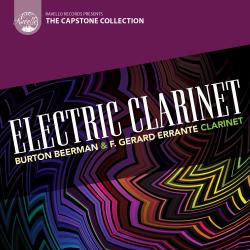 Having
drawn something of a blank with most of Shadows, I was
pleased to make immediate contact with Jane Brockman’s
Ningana, the first track on this recording, and the rest
of the album is also entertaining. Messrs Beerman and Errante
write in the booklet of their enjoyment in creating the album
and that’s evident from what you hear, whether played by
them on clarinet or created by the respective composers electronically.
Even Thea Musgrave is in more approachable vein than usual here
in Narcissus.
Having
drawn something of a blank with most of Shadows, I was
pleased to make immediate contact with Jane Brockman’s
Ningana, the first track on this recording, and the rest
of the album is also entertaining. Messrs Beerman and Errante
write in the booklet of their enjoyment in creating the album
and that’s evident from what you hear, whether played by
them on clarinet or created by the respective composers electronically.
Even Thea Musgrave is in more approachable vein than usual here
in Narcissus.
Judith SHATIN (1949– )
Piping the Earth
Piping the Earth [8:27]
Stringing the Bow [15:06]
Ruah [7:33]
The Passion of St. Cecilia [21:10]
Renee Siebert (Flute); The Prism Chamber Orchestra/Robert Black
(Ruah)
The Moravian Philharmonic/Joel Suben (other works) with Gayle
Martin Henry (Piano) in Saint Cecilia.
2-page pdf ‘booklet’ included
RAVELLO RECORDS RR7825 [52:16] – from classicsonline.com
(mp3) or stream from Naxos Music Library
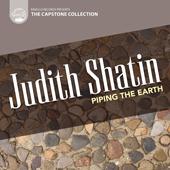 The
so-called booklet is simply a two-sided affair (apparently pp.1
and 6 of the complete booklet) containing just the titles and
times, so I started without information concerning the composer
or the music, other than the fact that Ruah is the Hebrew
word for breath, wind or spirit – a considerable oversight
when the music is unfamiliar. You can put that right by visiting
Judith Shatin’s website – here
– click on ‘compositions – orchestral’.
The
so-called booklet is simply a two-sided affair (apparently pp.1
and 6 of the complete booklet) containing just the titles and
times, so I started without information concerning the composer
or the music, other than the fact that Ruah is the Hebrew
word for breath, wind or spirit – a considerable oversight
when the music is unfamiliar. You can put that right by visiting
Judith Shatin’s website – here
– click on ‘compositions – orchestral’.
The music is powerful and not so avant-garde as to deter the
timid. I particularly enjoyed Stringing the Bow.
I hope to include more recordings from the Capstone Collection
in the next Download News.
Military
Music from Beulah
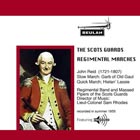 Military
music is a speciality of Beulah Extra; though by no means their
only raison d’être, I understand that it accounts
for a large percentage of sales and their November 2012 releases
add to the availability considerably. There are seven releases
of music from the band and pipers of the Scots Guards directed
by Colonel Sam Rhodes (1-7BX200), complete with the barking
of orders on 5BX200. It’s all well performed and
the recordings – mono, from 1955 – still sound very
well – full details from eavb.co.uk.
Military
music is a speciality of Beulah Extra; though by no means their
only raison d’être, I understand that it accounts
for a large percentage of sales and their November 2012 releases
add to the availability considerably. There are seven releases
of music from the band and pipers of the Scots Guards directed
by Colonel Sam Rhodes (1-7BX200), complete with the barking
of orders on 5BX200. It’s all well performed and
the recordings – mono, from 1955 – still sound very
well – full details from eavb.co.uk.
We’ve already had a good deal in the way of reissues of
the Eastman Rochester Wind Ensemble directed by Frederick Fennell,
grand masters of the music of their compatriot and arch patriot
John Philip Sousa – the last three letters of his
surname even proclaim his devotion to his father’s chosen
country – and others. Now they add the following:
27BX182 John Philip SOUSA
Hands across the Sea [2:49]
28BX182 The US Field Artillery [2:22]
29BX182 The Thunderer [2:38]
30BX182 Washington Post [2:29]
31BX182 King Cotton [2:38]
32BX182 El Capitán [2:14]
33BX182 The Stars and Stripes for ever [3:25]
34BX182 Louis GANNE
Father of Victory [4:49]
35BX182 Mariano San MIGUEL
The Golden Ear [3:50]
36BX182 David delle CESE
Inglesina [4:33]
37BX182 Frank MEACHAM
American Patrol [3:52]
38BX182 Carl Albert TIEKE Old
Comrades [4:34]
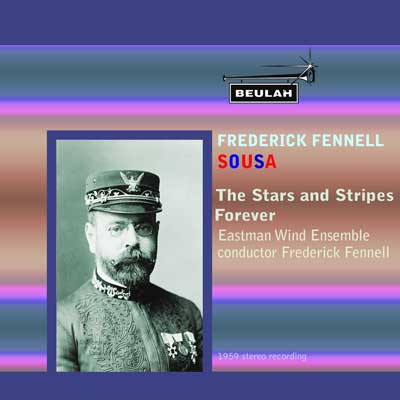 I
enjoyed the Fennell reissues especially; they are particularly
welcome at a time when the Universal catalogue seems to be shedding
Mercury recordings from the Golden Age of the late 1950s and
1960s when these were made. All the transfers sound excellent
– Mercury’s recording technology was always at the
cutting edge and Beulah’s magic has made it all sound almost
new-minted. The stereo recordings date from 1958 and 1959. Take
it in small doses or you may tire yourself out tapping your
feet in time – or even marching round the house, it’s
so contagious.
I
enjoyed the Fennell reissues especially; they are particularly
welcome at a time when the Universal catalogue seems to be shedding
Mercury recordings from the Golden Age of the late 1950s and
1960s when these were made. All the transfers sound excellent
– Mercury’s recording technology was always at the
cutting edge and Beulah’s magic has made it all sound almost
new-minted. The stereo recordings date from 1958 and 1959. Take
it in small doses or you may tire yourself out tapping your
feet in time – or even marching round the house, it’s
so contagious.
Mariano san Miguel’s The Golden Ear is a real discovery
with its Mexican flavour and there are plenty of old favourites
here, like Washington Post and Stars and Stripes, too. You won’t
find any of this repertoire better done. It’s all available
from eavb.co.uk.
You’ll also find on the same web page 15BX182-26BX182,
1961 Fennell recordings of Sousa which I reviewed in the September
2012/2 Roundup.
***
Preussische Festlieder– Sacred Songs
Johannes STOBAEUS (1580-1646)
Macht Hoch die Tür [3.29]
Such, wer da will ein ander Ziel [4.36]
Johannes ECCARD (1553-1611)
O Freude über Freud [3.56]
Johannes STOBAEUS Wes ist
der Stern [4.36]
Johannes ECCARD Maria,
das Jungfräulein [5.29]
Freu dich, du werte Christenheit [3.22]
Mein Sünd mich kränkt [3.22]
Zu dieser österlichen Zeit [1.43]
Freut euch, ihr Christen alle [2.20]
Der heilig Geist vom Himmel hoch [3.40]
Mir ist ein geistlichs Kirchelein [4.11]
Der Zacharias ganz verstummt [4.53]
Übers Gebirg Maria geht [5.03]
Mein schönste Zier und Kleinod bist [4.14]
Johannes STOBAEUS Gott
einen hellen Wunderstern [3.44]
Vocal Consort Dresden/Capella de la Torre/Peter Kopp – rec.
March 2011. DDD.
CARUS 83.265 [66:47] – from
eclassical.com
(mp3 and lossless) or stream from Naxos Music Library
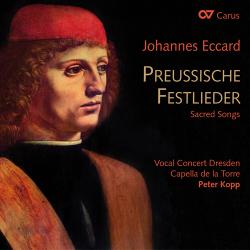
[‘These
pieces do have a spirituality of their own which can be quite
captivating in small doses. This is not a reflection on the performers.
They evidently understand the style, have ideal intonation and
clear diction with immaculate instrumental support.’ –
see
review
by Gary Higginson.]
It would be cheating a little to append the Christmas candle to
this review; though the earliest items cover the period from Advent
to Candlemas, there is also music for Passiontide, Easter and
Pentecost, too, all well performed and recorded. Only
Übers
Gebirg Maria geht is at all well known but the rest of the
music is well worth hearing and the performances and recording
do it justice.
There’s something of a trade-off between the eclassical.com
and classicsonline.com downloads; the former offers mp3 and lossless
for around the same price as the latter’s mp3 only, but without
the booklet which classicsonline.com and Naxos Music Library offer.
Disappointingly, however, that booklet is a cut-down 3-page-only
affair.

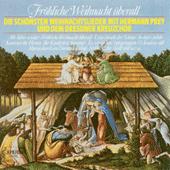
There’s
another (abbreviated) performance of
Übers Gebirg Maria
geht on a Capriccio recording which does merit the Christmas
candle:
die schönsten Weihnachtslieder mit Hermann
Prey und dem Dresdener Kreuzchor – the long-winded
title says it all: Christmas music, mostly by anon., but including
Prætorius, Eccard, Bach and the inevitable Grüber
Stille
Nacht, performed by Hermann Prey, the Dresdener Kreuzchor
and Dresden Philharmonic conducted by Martin Flamig. (
C10062
[54:39] – from
classicsonline.com
(mp3) or stream from Naxos Music Library). I don’t know when
this was recorded but Hermann Prey offers good performances of
several of the usual suspects.
Antonio VIVALDI (1678-1741)
La Senna festeggiante: Serenata a tre, RV693. (1726)
La Risonanza:
Yetzabel Arias Fernández (soprano, l’Età dell’oro)
Martín Oro, (alto, la Virtù)
Sergio Foresti, bass (la Senna)
Yanina Yacubsohn, Hélène Mourot (oboes)
Isabel Lehmann, Thera de Clerck (recorders)
Carlo Lazzaroni, Silvia Colli, Renata Spotti, Elena Telò
(violins I)
Mauro Lopes, Ulrike Slowik, Giacomo Trevisani (violins II)
Livia Baldi, Elena Confortini (violas)
Caterina Dell’Agnello, Claudia Poz (cellos)
Davide Nava (double bass)
Fabio Bonizzoni (harpsichord, director) – rec. June 2011.
DDD.
Pdf booklet with texts included
GLOSSA GCD921513 [78:12] – from
classicsonline.com
(mp3) or stream from Naxos Music Library
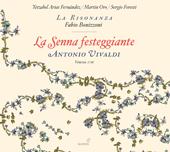 La
Senna festeggiante
La
Senna festeggiante (the Seine rejoicing) is one of three surviving
serenatas by Vivaldi. It’s a cantata in honour of Paris and
its River, the Seine (
la Senna), written in honour of the
French ambassador to Venice, probably for performance on the name
day of the French King, Louis XV. A small section of the score
is missing and has had to be reconstructed for this performance.
Despite this, it’s little wonder that the work has been revived
quite frequently in recent times; the music is very charming.
Not least of the attractions of this download is the inclusion
of the full luxury 56-page booklet with texts and translations,
which, surely, is how it should be – not just the 3-page
cut-me-down that comes with the Carus Eccard recording (above),
though that’s better than nothing at all, which still is
the case too often. The classicsonline.com download of the rival
Concerto Italiano/Alessandrini recording on Naïve
OP30339
is devoid of documentation.
The mp3 sound is good; the only reason for waiting would be the
probability that eclassical.com will release this recording in
lossless and mp3 format in the near future.
If you require only the
Sinfonia from
la Senna festeggiante,
L’Arte dei Suonatori can oblige on
BIS-CD-1845 –
download from
eclassical.com:
see February 2012/1
Roundup.
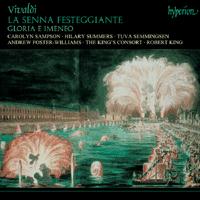
There’s
an older (2002) recording of
la Senna festeggiante from
the King’s Consort on Hyperion (
CDA67361/2 –
from
hyperion-records.co.uk).
With a slightly more complete reconstruction of the missing section,
it runs to 84:40, too long for a single CD, but that has given
Hyperion the opportunity to couple the earlier serenata
Gloria
e Imeneo, RV687, and the Sinfonia in C, RV116 on a 2-CD set
running to 146:31. Both recordings contain very good performances
and both offer the libretti. The Hyperion was reduced to £11.60
at the time of writing, but even at its regular price it costs
only the same per CD as the Glossa from classicsonline.com and
is offered in lossless flac for the same price as mp3. You can
hardly go wrong with either.
Felix MENDELSSOHN (1809-1847)
Violin Concerto in e minor, Op. 64 [24:45]
Hebrides Overture (Fingal’s Cave), Op. 26 [9:00]
Violin Concerto in d minor, Op. post. [21:34]
Alina Ibragimova (violin)
Orchestra of the Age of Enlightenment/Vladimir Jurowski –
rec. September 2011. DDD
Pdf booklet included
HYPERION CDA67795 [56:19] – from
hyperion-records.co.uk
(mp3 16– and 24-bit lossless)
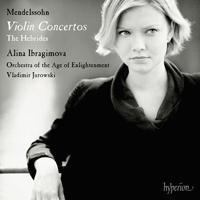
Having
received Geoff Molyneux’s thoughts on this recording a little
too late for the Download News 2012/20, I promised to include
them this time:
The light and delicate playing at the outset of the E minor Concerto
gives us a clue to the style of this player in this work. A similar
delicacy pervades the second theme, and Ibragimova’s way
with this piece is really suited to the second subject which follows.
Sometimes the whole thing seems a little fuzzy or woolly and the
orchestral playing occasionally lacks bite. But it is the way
Ibragimova’s tone sometimes fades during the course of a
note which I find a bit disconcerting, and sometimes a quaver
or two seem to disappear in the passagework in an orchestral haze.
There is a little more drama in the cadenza which leads to the
recapitulation, but greater mystery is provided in the wonderful
opening bars of the first movement in a performance by Angèle
Dubeau on the Analekta label. She and her orchestra are in a very
different mood world from Ibragimova, although Dubeau seems less
well integrated within the orchestral texture. You feel that Ibragimova
is one of the orchestral players. Dubeau’s is a more forthright
and even-toned approach, but I can certainly feel the marked
appassionato
in this
allegro molto movement from Dubeau, especially
as we travel headlong towards the closing bars. But Ibragimova
is very fleet-footed, light of touch and she wizzes along, unlike
Dmitry Sitkovetsky whose dramatic, more powerful but rather old-fashioned
sounding performance of this first movement takes several minutes
longer.
Jurowski and the band provide a beautiful introduction to the
soloist’s first entry in the second movement,
Andante.
The orchestra’s contribution is excellent here, there is
some lovely playing from Ibragimova and there is good textural
balance. One does not often hear absolutely impeccable ensemble
and clarity in the third movement, especially at this fast speed,
but we certainly do in this faultless performance on Hyperion.
As far as I can hear it is totally without flaw and I enjoyed
this movement totally. Stunning playing from all involved! Pinchas
Zukerman with Giulini is equally as fast, but I hear slight lapses
in ensemble. Also, I feel that Giulini wants to hold things back
a little, and I prefer Ibragimova’s phrasing of the main
theme to that of Zukerman. Ibragimova and Jurowski capture the
lively and jovial mood of this movement perfectly.
Ibragimova displays an impeccable technique with perfect intonation,
wonderfully musical in a performance to be enormously admired.
But for me she is sometimes just a little too reticent to give
the performance top marks. Maybe I am used to the old way of thinking
of the soloist as more of a star in 19th century concertos, but
she has a very refreshing approach to this oft-recorded work,
and it is well worth hearing.
We are treated to a well-paced performance of the
Hebrides
Overture from Jurowski and the orchestra. If you like a rather
dry sounding,
rubato-free perfomance, this could be for
you. I am accustomed to a more romantic approach to this piece,
one of Mendelssohn’s best early works. But there are some
wonderfully dramatic moments under Jurowski’s superb direction
and I grow to appreciate it more and more on repeated listenings.
Amazingly, Mendelssohn wrote the D minor Violin Concerto at the
tender age of 13. He had clearly absorbed the classical style,
and the violin is accompanied by strings alone. Ibragimova plays
with less vibrato than she does in the E minor concerto and I
feel that this matches the orchestra’s style rather better
in what is, after all, a more classical work. Soloist and the
orchestra are well-suited to the style of this work, and Ibragimova
plays impeccably throughout. Zoe Myers takes a similar tempo in
her performance on the BIS label, but she sounds more full-bodied
and stronger in the first movement. The second movement
Andante
moves along nicely in Ibragimova’s performance, whereas Myers
is much slower and rather too romantic in style. I like Isabelle
van Keulen best of all in this movement largely because her faster
speed seems appropriate, because the movement does not have strong
enough musical material to sustain momentum at too slow a tempo.
The final
Allegro in the Hyperion recording is suitably
jovial and vigorous with touches of sentimentality, though I prefer
Myers’ more straightforward approach to that of Ibragimova.
It is good to hear this work again, another reminder of the genius
of Mendelssohn as a child.
The Hyperion is a very fine release, recommended and well-worth
hearing, but there are so many excellent recordings of this fine
work. My own favourite is the recording on EMI Classics by Itzhak
Perlman and the Concertgebouw Orchestra conducted by Bernard Haitink.
As for the D minor concerto, I prefer Isabelle van Keulen on the
BIS label, but her recording is rather over-resonant. Maybe nothing
is ever perfect!
Geoffrey Molyneux
Johannes BRAHMS (1833-1897) Quintets
Op. 34 and 115
Clarinet Quintet in b minor, Op.115 [38:23]
Piano Quintet in f minor, Op34 [40:45]
Jon Nakamatsu (piano)
Jon Manasse (clarinet)
Tokyo String Quartet (Martin Beaver, Kikuei Ikeda (violins), Kazuhide
Isomura (viola), Clive Greensmith (cello))
rec. Sauder Concert Hall, Goshen College, Indiana, USA, November
2011. DSD.
HARMONIA MUNDI HMU807558 [79:13] – SACD or download
from
amazon.co.uk
(mp3)
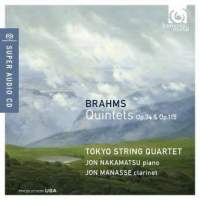
Two
works from opposite ends of Brahms’ career in performances
which face very strong competition, though the best of the opposition
is otherwise coupled. Some of the strongest opposition comes from
the Hyperion stable, whence I’ve chosen as my benchmarks:
–
CDA66107 Clarinet Quintet and Trio: Thea King and
the Gabrieli Quartet – CD and download (mp3 and lossless)
from
hyperion-records.co.uk.
This recording of the Clarinet Quintet is also included in a box
set with Brahms’ other chamber music,
CDS44331/42 –
review
–
CDA67551 Piano Quintet and String Quartet, Op.51/2:
Stephen Hough and the Takács Quartet – CD and download
(mp3 and lossless) from
hyperion-records.co.uk. See
review
and
Hyperion
Top 30 Roundup.
On matters of overall tempo for each movement of the
Clarinet
Quintet the Harmonia Mundi and Hyperion performers are very
largely in agreement. Jon Manasse, the clarinettist on the new
recording has recorded the two Brahms Clarinet Sonatas for Harmonia
Mundi (
907430). William Kreindler –
review
– thought the playing more mellow than dynamic and the same
is true of the Clarinet Quintet. As in the sonatas, there will
be many who prefer mellow to dynamic in this work that’s
often seen as the product of the composer’s Indian Summer,
but I think it’s possible to have both and that Thea King
comes closer to that ideal.
It’s something of an issue that will probably always divide
opinion on performances of Brahms. It recurs at its most acute
in the case of the Violin Concerto, the first movement of which
is almost always taken at a sedate pace and with mellow tone.
That’s fine if it works for you, but if you’ve ever
heard the classic Jascha Heifetz recording with Fritz Reiner,
still available in different couplings from RCA/BMG, you’ll
know that a faster tempo than usual works well and avoids the
impression that the concerto has two slow movements.
So it is with the Clarinet Quintet. King and the Gabrielis are
a mere six seconds faster in the opening
allegro but they
push the pace harder, without forcing it, and sound more dynamic.
There are moments when storm clouds threaten as opposed to the
less unvaried autumnal landscape which Manasse and the Tokyo Quartet
depict. I would choose the Hyperion performance by a small margin
but I can appreciate that for many listeners the boot would be
on the other foot.
If you want mellow, King and the Gabrielis give you that in the
andante – they even take a few second longer to deliver it.
I’ll say more about recording quality later but my impression
is that the Hyperion performers are a little more ‘present’
than those on the new recording.
In the two remaining movements dynamic is to the fore again, without
losing sight of the music’s autumnal qualities. I see that
Jens F Laurson, reviewing the multi-CD Hyperion box set was as
impressed by this recording as I am –
review.
It’s Thea King and the Gabrieli Quartet as my overall choice,
then, at least equally logically coupled with the Clarinet Trio
as with the Piano Quintet on the new Harmonia Mundi. The Trio
may not be quite on the same masterpiece level as either of the
quintets, but it’s well worth hearing in this fine performance,
as you might expect of works which share adjacent opus numbers,
but if you want the Thea King/Gabrieli Quartet version of the
Quintet without the Trio, that multi-CD Hyperion box set of Brahms’
chamber music is well worth considering. It contains another fine
recording of the Trio with Richard Hosford and members of the
Florestan Trio, plus a recording of the alternative with viola,
and it’s a notable bargain at £80 or less (£57
as a download from
hyperion-records.co.uk).
The issue is less clear cut in considering the
Piano Quintet.
As with the Clarinet Quintet, the Harmonia Mundi and Hyperion
performances vary little from each other in terms of the overall
tempo for each movement: the widest difference is to be found
in the opening
allegro non troppo and it amounts to just
41 seconds out of a total time of almost 15 minutes. This time
there’s little temptation to make the music sound autumnal,
though there are opportunities to caress it, even in that first
movement, and both sets of performers blend the youthful force
of the music with those more loveable moments, with the Tokyo
Quartet emphasising the softer edges a little more.
If you choose the Takács Quartet version of the Piano Quintet,
you may well find yourself tempted by the quality of their coupled
performance of the Op.51/2 String Quartet to snap up their recording
of the other two other quartets as well – I couldn’t
resist squeezing both discs in and cheating by counting them as
one in my
Hyperion
Top 30 Roundup.
Incidentally, fans of the Takács Quartet should be aware
that Hyperion have just released their new recording of Schubert’s
sublime C major String Quintet, with Ralph Kirshbaum (cello),
coupled with the Quartettsatz on
CDA67864 – my first
impressions are to place this at or near the top of the pile of
available recordings, though it's just a little short on emotion..
Bargain hunters, especially those without recordings of the Brahms
String Quartets or the Schumann Piano Quintet should be aware
of two fine recordings which fall into that category
– Brahms String Quartets, Op.51/1-3 and Piano Quintet –
Hyperion
CDD22018 (2-for-1): Piers Lane and the New Budapest
Quartet (download only for £7.99 from
hyperion-records.co.uk,
mp3 or lossless; also available as part of the multi-CD box
CDS44331/42
–
review.)
– Brahms Piano Quintet and Schumann Piano Quintet –
Naxos
8.550406: Jenö Jandó and the Kodaly Quartet
– download from
classicsonline.com
or stream from Naxos Music Library
The new recording comes in hybrid SACD format on disc whereas
the Hyperions are in ‘ordinary’ CD or its lossless flac
equivalent as downloads. On a level playing field, listening to
the Harmonia Mundi on a CD player as many listeners will do, the
sound is natural and well balanced; it’s credible without
trying in any way to be spectacular. If anything the Hyperion
has a touch more presence, which helps the performance to sound
more immediate and lively. The SACD stereo layer brings a touch
more presence to the new recording without quite achieving the
immediacy of the Hyperion.
The informative and lavishly illustrated booklet (not available
with the amazon.co.uk download, the only one available at the
time of writing) is almost too large to slot back into the CD
case; it’s a good ‘fault’ and one which it shares
with the Hyperion Piano Quintet, but it might have been easier
if Harmonia Mundi had adopted the round-shouldered cases which
have become common for SACDs and where the booklet is easier to
get back in situ. Alternatively they could have repeated their
strategy of packing the booklet not in the plastic case but alongside
that case in the cardboard wrapper as they did with their recent
Christopher Gibbons SACD, though that brings its own problems,
too.
(807551: Recording of the Month –
review).
The new recording of the Piano Quintet offers a strong challenge
to my Hyperion benchmark, then, and though my ultimate preference
for the Clarinet Quintet rests with Thea King and the Gabrieli
Quartet many will enjoy the autumnal blandishments of the new
recording.
Antonín DVOŘÁK
(1841-1904)
Symphony No. 9 in e minor, Op. 95/B.178 (1893) [42:38]
Česka suita (Czech Suite), Op. 39/B.93 (1879) [23:14]
Můj domov (My Home), Overture, Op. 62/B.125a (1882)
[9:28]
Malaysian Philharmonic Orchestra/Claus Peter Flor – rec.
August 2009 and September 2010. DSD.
Pdf booklet included
BIS-SACD-1856 [76:35] – from
eclassical.com
(mp3, 16– and 24-bit lossless) or stream from Naxos Music
Library
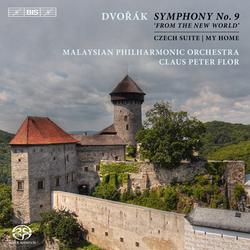
This
is the third of the recent BIS releases of the music of Dvořák
from the Malaysian PO and Claus Peter Flor:
– Symphony No 7,
Othello,
The Wild Dove BIS-SACD-1896
– see May 2012/1 Download
Roundup
– Symphony No.8,
Golden Spinning Wheel,
Scherzo
Capriccioso BIS-SACD-1976 – see September 2012/1
Download
Roundup
Sadly, recent well-publicised problems mean that this may be not
only their last Dvořák recording but their last ever.
I wish I could say that it would be my future benchmark, for it
has many fine qualities, but there is tremendous competition in
these three late Dvořák masterpieces and, as before,
the new release ends as a very good also-ran in the face of competition
from the likes of Rafael Kubelík – still my top choice
of all time.
Kubelík’s BPO recordings of Nos. 8 and 9 for DG are
coupled on one disc – available for £4.99 from the
newly refurbished
hmvdigital.com.
Alternatively Kubelík’s Nos. 6-9 are on a 2-CD set,
even better value at £8.49 from
hmvdigital.com,
with the 6-CD set of all nine for £22.99 from hmvdigital.com.
The same attractive coupling of the Eighth and Ninth can also
be had in excellent performances and more recent recording –
mp3, 16– and 24-bit lossless and DSD – from Iván
Fischer and the Budapest FO (Channel Classics
CCSSA90110).
The
Czech Suite and
My Home receive fine performances
on the new BIS release; if the coupling appeals and/or if you
prefer the excellent 16– or 24-bit lossless versions to the
320 kb/s mp3 of Kubelík – still very good for its
age – you won’t be disappointed. The
Czech Suite
is also the coupling for the Ninth on the recent Warner Classics
recording with the Bournemouth SO/José Serebrier (
2564666563
– see November 2011/2
Roundup).
Serebrier’s dance-orientated Ninth is not quite in the top
league; all in all, if you’re looking for the coupling I
think you will be better served by the BIS recording, especially
if you’re looking for lossless sound for around the same
price as mp3 downloads of the Warner.
Boult conducts Parry
Sir Hubert PARRY (1848-1918)
Overture to an Unwritten Tragedy* (1893) [10:25]
An English Suite in G* (c1921) [20:57]
The Birds (1883) – Bridal March**[5:21]
Lady Radnor’s Suite in F* (1894) [13:25]
Symphonic Variations*(1897) [12:53]
* London Symphony Orchestra, **London Philharmonic Orchestra/Sir
Adrian Boult.
No rec. info. ADD
All works except for the Bridal March recorded in association
with The RVW Trust.
LYRITA SRCD.220 [64:09] – from
emusic.com
(mp3)
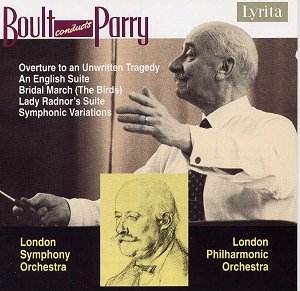
A
couple of months ago I took up the cudgels on behalf of Parry;
there could be no better recording than this to continue the campaign.
Colin Clarke –
here
– and David Dunsmore –
here
– have both written appreciatively about this recording,
so I need only add that the emusic.com download, though made at
a low bit-rate, around 192kb/s, sounds more than acceptable, though
no match for the CD which I own, and that Boult’s performances
of the Suites make the very worthy recording of them on Naxos
8.550331 sound dull indeed. For some crazy reason all the
download providers that I’ve checked are asking in the region
of £9 for the Hickox recording, formerly available at budget
price on EMI. Even worse, the CD is on offer for £36; good
as that Hickox recording is, stick with Boult.
Claude DEBUSSY (1862-1918) Solo
Piano Music
Children’s Corner [17:05]
Suite bergamasque [18:27]
Danse [5:28]
Deux Arabesques [7:43]
Pour le piano [14:06]
Masques [5:03]
L’isle joyeuse [6:42]
La plus que lente [4:51]
Angela Hewitt (piano)
HYPERION CDA67898 [79:25] – from
hyperion-records.co.uk
(mp3, 16– and 24-bit lossless)
We’ve had quite a lot of orchestral Debussy recently, much
of it arrangements of his piano music, so it’s nice to welcome
Angela Hewitt’s foray into the originals. Geoff Molyneux
got his thoughts into shape first; I gave a brief welcome in the
last Download News and there’s so little that I can usefully
add, except to remind you of her earlier Ravel recordings, Hyperion
CDA67341/2 – from
hyperion-records.co.uk
(mp3 and lossless) –
review:
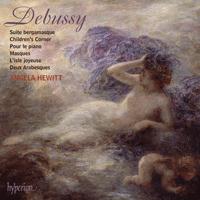
This
beautifully played recital of piano music by Debussy begins with
Children’s Corner. The first piece,
Doctor Gradus
ad Parnassum receives a beautifully articulated performance,
fast and lively but with plenty of expression. It is much more
than just a warm-up exercise for Hewitt, and her account has a
touch more drama compared with Pascal Rogé. She captures
the gentle mood of
Jimbo’s Lullaby superbly well,
and in
Serenade for the Doll, as in all the works recorded
here, Hewitt observes every detail of expression and articulation
as marked by Debussy with meticulous attention to detail. Pascal
Rogé’s classic account of these works is equally wonderful
and has always been amongst my favourites, but the recording sounds
a bit dated compared with this new Hyperion release.
The Snow
is dancing is characterised by a delicacy and lightness of
touch.
The little Shepherd has great poise and the little
recitative-like sections are perfectly given, whilst
Golliwogg’s
Cake-Walk packs a real rhythmic punch. I particularly like
Hewitt’s phrasing in the middle section with its references
to Wagner’s
Tristan.
The
Suite bergamasque is given a fine performance. I also
like Jean-Efflam Bavouzet on Chandos in this work, but I have
a preference for Hewitt’s rather more spacious accounts of
the
Prelude and
Minuet.
Clair de lune, such
a familiar piece, is given a new lease of life and sounds afresh
in Hewitt’s hands, but I marginally prefer Nelson Freire
and also Bavouzet, who is more flowing. I would have preferred
Hewitt to have retained the
pianissimo for longer with
a less aggressive accelerando so near the beginning of the work,
but nevertheless, this is a beautifully conceived performance
with mostly convincing
rubato. There is excellent balance
and the melodic lines are given with a lovely rich tone.
The heavily syncopated rhythm at the start of
Danse is
convincingly articulated by Hewitt, and she maintains the excitement
throughout the performance which is full of life and vitality.
The first of
Deux Arabesques is given an ideal performance
with totally convincing tempo changes and rubato, whilst the second
is played as if it should be, light and airy and full of wit and
humour. Hewitt is slower than Bavouzet here, but this allows for
greater clarity in the triplet semiquaver figures, especially
at the start of the piece.
In
Pour le piano Hewitt sets an ideal pace for the Prelude
and there is a real air of mystery in the main theme following
the introductory flourish. Hewitt’s tempo changes are more
convincing than those of Jean-Bernard Pommier on Virgin Classics.
In all three movements Hewitt is marginally slower than Pommier,
whose performances are also outstanding, but Hewitt gets my vote
because of her greater range of expression, especially in the
Sarabande.
L’isle joyeuse is given a beautifully coloured and
atmospheric performance with an amazing variety of touch, articulation
and expression, culminating in a thrilling climax. She is considerably
slower than Yvonne Lefébure on the Solstice label, but
Hewitt is more effective and much better recorded.
La plus
que lente provides a fine conclusion to this Debussy recital.
Maybe it is a little on the slow side for some tastes, but Noriko
Ogawa on the BIS label is even slower and her recording is a bit
cavernous.
I should just mention the subtlety of Hewitt’s pedalling.
It is used sparingly so there is always great clarity and when
she does introduce the pedal it is always telling and effective.
Hewitt’s performances are outstanding and are amongst my
favourite recordings of these delightful works, along with those
by Pascal Rogé and Jean-Efflam Bavouzet. Hewitt seems able
to pay attention to every detail demanded by Debussy in his scores
and at the same time give us the feeling that her playing is totally
spontaneous. This is yet another excellent recording from Hyperion.
Geoffrey Molyneux
Boult Conducts
George BUTTERWORTH (1885-1916)
Two English Idylls [4:58 + 4:32]
The Banks of Green Willow [5:33]
‘A Shropshire Lad’ Rhapsody [8:35]
Peter WARLOCK (1894-1930) An
Old Song for small orchestra [5:56]
Patrick HADLEY (1899-1973)
One Morning in Spring – Rhapsody for small orchestra [3:54]
Herbert HOWELLS (1892-1983)
Procession [4:51]
Merry-eye* [8:50]
Elegy for viola, string quartet and string orchestra* [9:05]
Music for a Prince*: Corydon’s Dance [7:11]; Scherzo in Arden
[5:17]
London Philharmonic Orchestra/Sir Adrian Boult
Herbert Downes (viola)*; Desmond Bradley, Gillian Eastwood (violins);
Albert Cayzer (viola); Norman Jones (cello)
New Philharmonia Orchestra/Sir Adrian Boult – rec. 1970,
1979, 1977. ADD
LYRITA SRCD.245 [68:46] – from
emusic.com
(mp3)
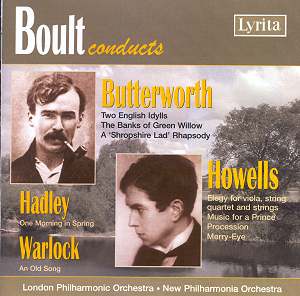
If,
like me, you missed these recordings when they were first released
on LP and again on CD in 2007, here’s your ideal chance to
catch up without breaking the bank at just £4.62 from emusic.com.
The bit-rate, as usual with this supplier, is rather mean, around
180kb/s, but you won’t get much better by spending more from
hmvdigital.com or amazon.com. In fact, the recordings still sound
well and the performances are beyond praise; however well others
have performed the music of Butterworth and the others included
here, none can quite compare with Boult unless, perhaps, it be
Barbirolli. John Quinn made it a deserving
Recording of
the Month –
review
– and Rob Barnett was also appreciative of its merits –
review.
There’s no booklet with the download – to obtain that
you need to purchase the CD from MusicWeb International (£11.75
inc. p&p –
here).
There’s another Boult recording of
One Morning in Spring
on BBC Legends (
BBCL4256-2, from
classicsonline.com
(mp3), with Vaughan Williams Symphony No.6, etc.) and the Lyrita
recording of Hadley’s
The Trees so High, with Finzi’s
Immortality Ode is unmissable on
SRCD.238 –
review
–
review:
Recording of the Month and
review.
Writing in the January 2009
Roundup
I criticised the emusic.com download for placing too many dropouts
between tracks in the Finzi. Using Winamp or Songbird or the Windows
7 version of Windows Media Player should solve the problem.
William WALTON (1902-1983) Troilus
and Cressida – excerpts
Act I: Is Cressida a slave … [9:43]
Act I: Slowly it all comes back [5:51]
Act II Scene 1: How can I sleep [4:00]
Act II Scene 1: If one last doubt, one lurking fear remains …
[16:50]
Act III: All’s well! Is there no word [11:59]
Act III: Diomede! … Father! … [4:13]
Richard Lewis, Elisabeth Schwarzkopf, Monica Sinclair, John Hauxvell,
Geoffrey Wells, Lewis Thomas
Philharmonia Orchestra/William Walton – rec. 1954. ADD/mono
NAXOS CLASSICAL ARCHIVES 9.80131 [52:36] – from
classicsonline.com
(mp3). Not available in the USA, Australia or Singapore.
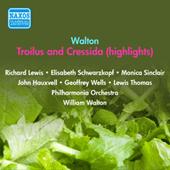
Even
though there are two later recordings of the (revised) complete
opera, from Lawrence Foster, with Janet Baker, and an excellent
version from Richard Hickox on Chandos, this 1955 set of excerpts
is still of more than historical value. Though Schwarzkopf apparently
disliked the role, you would hardly think so and the composer’s
direction is, of course, authoritative. At just £1.99 the
classicsonline.com download is less expensive than that from emusic.com
and, unlike the latter, which barely reaches 160kb/s, it comes
at 320kb/s. The mono recording still sounds well – just a
trifle dry.
For details of the history of
Troilus and Cressida on stage
and on record, see Len Mullenger’s article
here.
Those in search of more Walton conducted by Walton should not
forget two recordings with that title: Lyrita
SRCD.224 (
Portsmouth
Point,
Siesta,
The Quest,
Sinfonia Concertante,
etc., from
amazon.co.uk
–
review
and
review)
and EMI
9689442 (2 CDs: Symphony No.1,
Belshazzar’s
Feast, Violin and Viola Concertos – from
hmvdigital.com
– see
review
of 8-CD box from which this is excerpted).
William WALTON
Portsmouth Point [5:34]
Siesta [4:36]
Scapino [8:39]
The Wise Virgins (ballet suite, after
J
S BACH) [19:29]
Joseph Shadwick (violin); London Philharmonic Orchestra/Sir Adrian
Boult – rec. 1954. ADD/mono
NAXOS HISTORICAL ARCHIVES 9.80598 [38:28] – from
eclassical.com
(mp3 and lossless) or stream from Naxos Music Library (not available
in USA, Australia or Singapore).
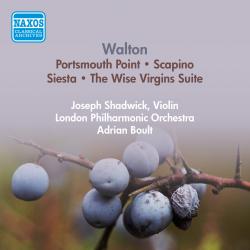
I
listened to this in mp3 and in the lossless flac version from
eclassical.com and I’ve no hesitation in saying that the
recording has come up so bright and fresh as paint in the latter
format, a tribute to the Naxos re-mastering, that it’s worth
paying a little more ($6.92 – not a price to break the bank)
for that version as against classicsonline.com’s £1.99
or emusic.com’s £3.78. Any one of these is a real bargain
when you consider that the LP cost £1.16.5 in 1955 –
at least £45 in today’s values.
The LPO may not have been a crack orchestra in 1954 but having
Boult at the helm more than compensates. This version of
Sheep
may safely graze, from
The Wise Virgins, in 7"
ep format, graced many a primary school assembly for decades.
Surprisingly, AP declared the recorded sound on the 10" Decca
LP of
The Wise Virgins a failure back in 1955, without
saying why. He later modified that criticism when all the works
here appeared in 12" guise, though still complaining of pre-echo
and surface noise, all of which seems to have been removed from
the astonishingly good Naxos reissue.
This performance of
The Wise Virgins also appears on a
Beulah reissue,
Ballet by arrangement,
1PD40,
alongside arrangements by Constant Lambert, Vincenzo Tommasini
and Jean Françaix: from
iTunes
(mp3) – see August 2010 Roundup.
Monteverdi
on DVD
Claudio MONTEVERDI (1567-1643)
L’incoronazione di Poppea
Philippe Jaroussky (counter-tenor) – Nerone
Danielle de Niese (soprano) – Poppea
Anna Bonitatibus (mezzo soprano) – Ottavia
Max Emanuel Cencic (countertenor) – Ottone
Antonio Abete (bass) – Seneca
Ana Quintans (soprano) – Drusilla
Claire Debobo (soprano) – Fortuna, Pallade, Venere
Katherine Watson (soprano) – Virtù/Damigella
Hanna Bayodi-Hirt (soprano) – Amore
Suzana Ograjanešek (soprano) – Valletto
José Lemos (counter-tenor) – Nutrice/un famigliare
di Seneca
Robert Burt (tenor) – Arnalta
Mathias Vidal (tenor) – Lucano
Andreas Wolf (bass) – Tribuno/Liberto
Damian Whiteley (tenor) – Mercurio/Littore Tribuno/un famigliare
di Seneca
Juan Sancho – un famigliare di Seneca/Tribuno/Console
David Webb – un famigliare di Seneca/Tribuno/Console
Les Arts Florissants/William Christie
Pier Luigi Pizzi (director, set and costume designer)
rec. live Teatro Real, Madrid, May 2010. DSD.
NTSC. 16:9. Region 0 (region free). PCM stereo/5.1 surround sound.
Subtitles in Italian (original), English, French and German.
VIRGIN CLASSICS DVD 07095191 [2 DVDs: 180:00]
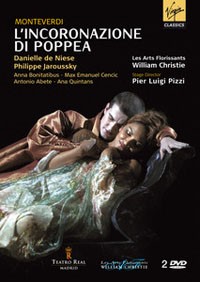
This
recording has challenged my belief that
l’Orfeo and
il Ritorno d’Ulisse take first and second place in
Monteverdi’s output with
Poppea a poor third.
José M Irurzun posted an appreciative review and photograph
of this production on our Seen and Heard pages in 2010 –
here
– so it’s hardly surprising that I enjoyed the DVDs
so much. Firstly, a clear decision was made to opt not for a conflation
of the Naples and Venice versions, which usually happens, but
for a new edition of the Venice original. That’s just one
advantage, to which I would add William Christie’s sure direction,
Philippe Jaroussky’s unique voice and Danielle de Niese’s
vivacious appearance and singing. Not least, too, the director
has been content largely to leave well alone, with none of the
disfiguring gimmicks which have beset so many recent operatic
productions.
Philippe Jaroussky not only sounds the part; he looks it, too
in two important respects. Not only is Nero a megalomaniac, he’s
also uxorious, caring naught for Rome in his besotted love for
Poppea. The huge fur cloak which he wears at the outset perhaps
helps him, but his facial expressions, aided and abetted by the
make-up team are mostly responsible. His very light, soprano-like
countertenor is a bit of an acquired taste, but it’s one
that I acquired some time ago when reviewing his recital recordings
and it’s his Nero that I shall remember now, rather than
Elisabeth Söderström on the Harnoncourt CD set which
I own (now Warner Classics
2564692611, 3 CDs.) In fact,
I shall probably choose the Christie DVD as my listening choice
in future, even in audio only, rather than the Harnoncourt.
Danielle de Niese brings this production to life; not only is
she what psychologists call a YAVIS personality (young, attractive,
vivacious, intelligent and successful) but she has the voice to
match. She achieves the same effect in the role of Cleopatra in
the Christie-directed Glyndebourne DVD recording of Handel’s
Giulio Cesare (
OA0950D – see
review.)
As there, she tends to go ‘a bit overboard at time’,
as Kirk McElhearn puts it, though less than before – and
it’s more appropriate to the role of Poppea. If she’s
a little squally at times, that’s not something that bothers
me. She’s already a pluralist in the role, having played
the part under Emanuelle Haïm’s direction (Decca
0743339
–
review).
Anna Bonitatibus is becoming something of a fixture in the Christie
pantheon as the put-upon wife – as Dido in
la Didone
and here as Octavia. She also takes the role of the long-suffering
Juno in Cavalli’s
Ercole Amante, conducted by Ivor
Bolton (Opus Arte
OA1020D –
review).
Of the three principal singers she gets at least as much applause
as the more glamorous protagonists – José Iruzun suggests
more than de Niese on the night that he was there – and deservedly
so. Her
Addio Roma is particularly impressive.
Antonio Abete portrays a convincingly weighty Seneca both vocally
and in acting terms and Max Cencic is convincing in both respects
as Ottone. Indeed, there isn’t a single weak member of the
cast. A bit of ham acting from José Lemos as the Nurse
doesn’t come at all amiss.
The accompaniment is not over-large; though two harpsichords may
seem extravagant – one from which William Christie directs
– in the event the sound is well balanced. Christie’s
guiding hand ensures that all is well, as, indeed, it does in
his two DVD recordings of il Ritorno d’Ulisse (Virgin
4906129
and Dynamic
33641 –
review)
and the DVD of Cavalli’s
la Didone which I recently
greatly enjoyed. (Opus Arte DVD
OA1080D –
review.)
The costumes are neither period (Roman or renaissance) nor modern
but neutral. They may look a bit drab, but they don’t distract
your attention, and that’s a big plus for me. The same is
true of the scenery – like the Australian
Don Giovanni
which I’ve praised in my Download News 2012/20 (Opera
Australia
OPOZ56024BD, blu-ray,
OPOZ56023DVD), they
are pretty minimalist but, again, that’s better than setting
Don Giovanni in a wood or Handel’s
Rinaldo
in a school. Basically there are three sets – one each for
the palace and Poppea’s and Seneca’s houses. If, as
José Iruzun says, the action is sometimes static, that’s
as much Monteverdi’s fault as anyone’s – if there’s
not much for the singers to do, I’d rather the producer didn’t
invent something silly for them.
Camerawork and sound are very good indeed – the former is
not too ‘busy’ and the latter is especially effective
when heard on a decent audio system. I doubt whether blu-ray would
have improved much.
Of all the versions currently available on CD and DVD, this appears
to be one of the least expensive at around £20. Not that
that should be the only argument in its favour, but it is a strong
secondary reason for recommendation.
I do, however, have one serious reservation in that the documentation
is almost non-existent. I’m sure from my colleague’s
Seen and Heard review that the Madrid audience gleaned much more
information from their programmes than is available in Virgin’s
simple bi-fold leaflet.
Documentation – or lack thereof – apart, this is a very
strong contender indeed. It dramatically changed my opinion of
Poppea as an also-ran to
l’Orfeo and
il
Ritorno d’Ulisse.
Claudio MONTEVERDI il Ritorno
d’Ulisse in patria (SV325, Ulysses’ Homecoming)
(1639/40)
Vesselina Kasarova (mezzo-soprano) – Penelope
Dietrich Henschel (tenor) – L’humanita Fragilita/Ulisse
Malin Hartelius (soprano) – Melanto
Jonas Kaufmann (tenor) – Telemaco
Rudolf Schasching (tenor) – Iro
Isabel Rey (soprano) – Minerva/Amore
Martina Janková (soprano) – Fortuna/Giunone
Orchestra La Scintilla of the Zurich Opera House/Nikolaus Harnoncourt
Klaus-Michael Grüber (stage director)
Set Design by Gilles Aillaud
Sound Format: PCM Stereo, DD 5.1
Picture Format: 16:9
DVD Format: DVD 9, NTSC
Subtitles: Italian (Original Language), English, German, French,
Spanish, Japanese, Korean.
FSK: 0
Region: 0
Format: NTSC
Rec. live Zurich Opera House, 2002
ARTHAUS MUSIK DVD 101660 [155:00]
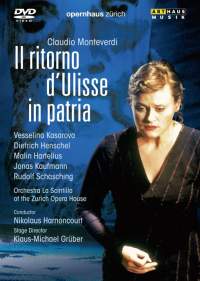 Il
Ritorno d’Ulisse
Il
Ritorno d’Ulisse, like the closing cantos of the Odyssey
from which the story-line is taken, is a life-enhancing work.
Leaving aside the vexed question of its authorship, it has become
over the years my favourite of Monteverdi’s three operas
despite the admitted blandishments of
l’Orfeo;
Poppea
was still out on probation for me until I watched the Christie
DVD, which has convinced me of its merits.
This recording of
il Ritorno has been available for some
time on earlier Arthaus DVDs,
100352 (still available)
and
100353 (currently reported to be out of stock). Nikolaus
Harnoncourt’s earlier Zurich video recording remains available
on a budget-price set of five DVDs with the other two Monteverdi
operas costing only a few pounds more than the Arthaus versions
of the single opera (DG Unitel
0732478, a bargain for around
£22.50).
Peter Grahame Woolf reported on this production for MusicWeb International
Seen and Heard –
here
– rating it ‘worth seeing but not meriting a substantial
special journey’, which just about sums up my response to
the DVD. Singing and acting are good but not outstanding.
I first got to know this opera from Harnoncourt’s pioneering
LP recording with the Vienna Concentus Musicus – still available
complete on three Warner Teldec CDs for around £10 (
2564696142)
with excerpts at around half that price on Apex
2564615082
–
review
– and that recording is still worth considering: download
from
hmvdigital.com.
Reviewing the original DVD release of this Zurich set –
here
– Peter Wells enjoyed the music and the performance but thought
that the minimalist production added little to the effect. My
own reaction is quite different; sated with clever-clever productions
that shift the action in time and place and annoy the viewer with
pointless gimmicks, the production and costumes are for me among
the main reasons for recommending the reissue.
Even Glyndebourne are at it now, as witness the DVD set of Handel’s
Rinaldo (Opus Arte) which arrived in the same post as the
Monteverdi, so the Zurich production comes as a pleasant contrast,
even Ulisse’s not very fetching fisherman’s jumper.
We seem to be fortunate with recordings of
Il Ritorno d’Ulisse
in this respect, since the other two DVD sets which I own, both
with William Christie and Les Arts Florissants, are also largely
gimmick-free, especially the Virgin DVD:
– VIRGIN
4906129, recorded at Aix Festival, now available
again from some dealers
– DYNAMIC
33641, recorded at Teatro Real, Madrid –
review
One or two aspects of the Dynamic production, such as the live
eagle, raised my hackles marginally, but much less so than many
of the efforts that I’ve seen recently. The singing on the
Virgin set from the Aix festival is much better than that on the
Dynamic, which can now be ruled out in the light of the virtues
of the performance on the new Arthaus reissue and on Virgin.
The costumes are vaguely modern, though Melanto wears something
more akin to 18th-century. There are minor disappointments, such
as the lack of visual clues – Minerva doesn’t wear her
distinctive helmet and Penelope’s spinning wheel and loom
are nowhere to be seen – but very little that really irked
me. Jupiter and Neptune dressed like Estragon and Vladimir from
Waiting for Godot came pretty close.
The biggest visual disappointment concerns the royal palace, of
which we see the outside looking for all the world like a peasant’s
cottage with whitewashed walls. For all the minimalism of the
Virgin set we see the interior of something a little more elaborate
– when the palace is described as debased, that’s meant
figuratively, not literally – and we see Penelope at her
work, making the tapestry by day which she will unpick at night
in order to avoid completing it and having to carry out her promise
to marry one of the suitors when it’s complete.
The idea of having the three suitors manipulate puppets of themselves
on a stage the curtain of which is decorated with the Greek word
Theatron – one for the classicists – works well
until it comes to the stringing of the bow. Then we have to have
two bows – a small one for the puppets to fail to string
and a much larger one for Ulysses to shoot with. Nor is the death
of the suitors as spectacular as it can be in some productions.
Despite what I’ve said about the comparative lack of distraction
from the Zurich production, once I’ve seen a production I
usually return to it in audio only. There is no blu-ray equivalent
of this DVD set, as far as I’m aware, but I don’t think
you will be disappointed with either the picture or the sound,
even as heard from the TV, but especially if you feed it through
a decent audio setup. I shall, therefore, probably find myself
listening to these Harnoncourt DVDs in audio only – both
on the better of my blu-ray players which links with my main audio
system and as played from my computer via the system in my study.
In which case, you may well prefer to economise and go for Harnoncourt’s
Teldec set – our friends at MDT currently have this for less
than £10 – or the equally inexpensive Brilliant Classics
box for around £8; the latter, directed by Sergio Vartolo,
despite some slow tempi, has a strong claim to be the most satisfying
version of all and the documentation is
de luxe, a model
of how to present a budget-price recording. This is a scholarly
version but the scholarship never gets in the way of enjoyment
(Brilliant
93104).
This Arthaus DVD set has its merits, but if you must have the
pictures too, Christie on Virgin remains my first choice.












